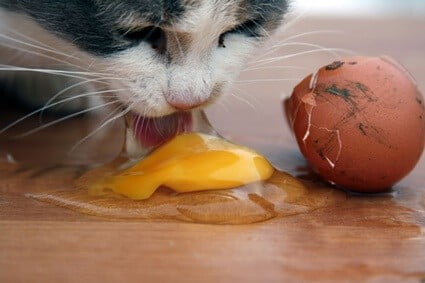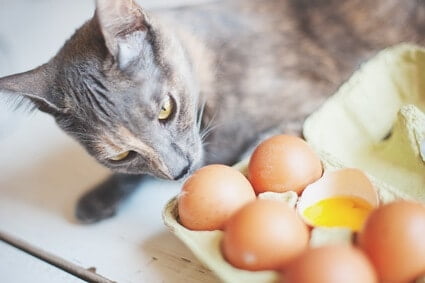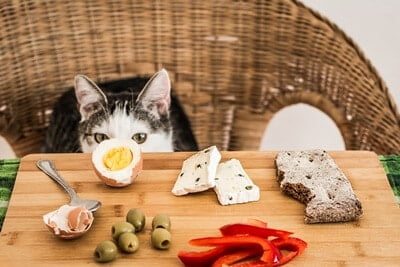Egg whites and yolks are high in protein, contain no carbohydrates, and are a source of healthy fats. Given those health benefits, you may wonder if cats are allowed to eat eggs. Well, cats can eat cooked eggs, but not raw eggs.
Eggs can be fed to cats, but they must be cooked. Raw eggs contain avidin, a protein that prevents biotin from being absorbed into the cat’s body. Raw eggs can contain salmonella, but cooking the eggs kills this bacteria and neutralizes the avidin. Eggs should be boiled (or poached), deshelled, and broken into bite-sized pieces.
Don’t throw away those eggshells because they are a good source of calcium. After cooking an egg, peel the shell, let it cool and dry, and grind it down. The shell should be ground into fine particles that resemble grains of sand. Sprinkle ½ teaspoon over your cat’s food to boost its calcium intake.
Can You Feed a Cat Raw Eggs?
As discussed, cats cannot eat raw eggs. Cats run the same risk of contracting salmonella as humans do. Not only this, but raw egg whites contain a glycoprotein called avidin. This protein interrupts the absorption of biotin due to the avidin-biotin interaction. Avidin binds with biotin, preventing it from being absorbed.
Cats need biotin (vitamin H) to maintain a healthy coat, skin, and claws. Biotin is also important for carnivores, as it assists the body with eliminating protein by-products. It also supports other bodily functions and organs, such as the reproduction and nervous systems and the thyroid and adrenal glands.
Cooking eggs kills any salmonella bacteria and neutralizes the avidin in egg whites.
Signs of Biotin Deficiency
A study in The Journal of Nutrition found that cats can naturally produce biotin, so they don’t need a dietary source. However, a biotin deficiency can still develop if a cat eats raw egg whites. This is because the avidin in the raw egg whites prevents biotin from being absorbed.
Instead, the avidin-biotin pairs are eliminated. If the cat is fed raw egg whites repeatedly, biotin deficiency will present itself as skin problems. The signs of biotin deficiency as:
- Dermal lesions
- Scaly dermatitis
- Achromotrichia, which is a loss of pigment in the fur
- Dried salivary, nasal, and lachrymal secretions (in female cats only)
- Weight loss
- Bloody diarrhea
A vet may suggest a biotin supplement to aid recovery from a biotin deficiency.
Signs of Salmonella Poisoning
Salmonella is a zoonotic disease that leads to an inflammation of the intestine and, if untreated, septicemia. This can result in death, even with treatment. Raw eggs can contain salmonella, which is a bacteria that’s transmissible to humans. The signs of salmonella infection include:
- Vomiting
- Diarrhea
- Abdominal pain
- Mucus in feces
- Weight loss
- Fever
- Lethargy
- Loss of appetite
- Depression
- Dehydration
- Swollen lymph nodes
- Rapid heart rate
- Skin disease
- Vaginal discharge
- Shock
- Blood loss
Female cats that are pregnant may also miscarry.
Can You Feed a Cat Cooked Eggs?
Cooked eggs are a good source of protein and amino acids for cats. They are also packed with the vitamins B, A, D, E, and K. Plus, thiamine, iron, zinc, selenium, and riboflavin. Including cooked eggs, in moderation, in your cat’s diet can be beneficial to its health. Additionally, eggs are quite fatty, so they’re good for weight loss recovery.
Cats can be allergic to eggs. Starting with a small amount and monitor it for any ill effects. Signs of an egg allergy could include vomiting, diarrhea, itchy skin or ears, and skin infections. After a week, if no symptoms present themselves, you can begin making eggs a regular treat. Cooked eggs must be fully cooked with no runny yolks.

Can Cats Eat Eggs And Cheese?
Almost all cats are lactose intolerant. Even ingesting a small amount of dairy can cause gastrointestinal discomfort and distress, like vomiting and diarrhea. That said, many vets feel that some cheese, on rare occasions, won’t do any harm.
Just as with eggs, cats can also have dairy allergies. Even a small morsel of cheese can trigger a reaction. Cats really should steer clear of milk, cheese, and all other dairy products.
However, if your cat steals a piece of your egg and cheese omelet when you aren’t looking, it’ll be okay. On the other hand, if you’re looking to include eggs in a cat’s diet, feed it plain poached or hard-boiled eggs. Scrambled eggs should be okay, depending on how they’re cooked.
Can Cats Eat Eggshells?
The Journal of the Science of Food and Agriculture notes that chicken eggshell powder is a good sound of calcium. The research has found that cats will benefit from eating eggshells.
95% of an eggshell’s makeup is calcium carbonate, while the remaining 5% is a complex mix of proteins, which affect how the calcium forms and protects the liquids within. Calcium must be included in a cat’s diet, and crushed eggshells are a means of ensuring that happens.
A cat lacking in dietary calcium will develop a calcium deficiency. Calcium is vital for growing kittens and maintaining healthy body functions in cats of all ages. This includes bone growth, muscle contractions, blood clotting, nervous system function, alongside many other bodily functions and organs. The symptoms of calcium deficiency include:
- Vomiting
- Weakness
- Loss of appetite
- Rigid limbs
- Difficulty walking
- Restlessness
- Depression
- Disorientation
- Hypersensitivity
- Face rubbing due to itching
- Muscle twitches
- Tremors
- Seizures
Untreated and severe cases of calcium deficiency can result in death. Other underlying health issues can also cause a calcium deficiency. These symptoms can be mitigated by feeding your cat eggshells. As long as there aren’t any other health issues, including eggshells in the cat’s diet may also prevent a calcium deficiency from ever developing.
Eggshells should be crushed to avoid choking or internal blockages and sprinkled over your cat’s regular food. To eliminate concerns about salmonella or avidin, cook the eggshells. After they have cooled, crush the shells into small pieces or until it looks like fine grains of sand.
Sprinkle roughly ½ a teaspoon of this grainy mixture over your cat’s food and store the rest in an air-tight container. Consult with your vet about how frequently eggshells should be given to your cat.
Do Cats Like Eggs?
A cat can be picky about what it eats. The question of do cats like eggs really comes down to the individual preferences of your cat. Across the board, it appears that many cats enjoy eating eggs.
Do Cats Need Eggs?
Cats are obligate carnivores that derive all the nutrition needed from eating meat. Thus, a cat does not need to eat eggs. In saying that, occasionally adding eggs to your cat’s diet can be beneficial in moderation.
The abundance of protein and amino acids in eggs is useful for ensuring that your cat is getting all the nutrition it needs. Eggs are also a good source of taurine.
Eggs cannot replace other essential foods in a cat’s diet. They should only be considered treats or an addition to regular meals. Eggs should not comprise more than 5% of your cat’s overall diet.

Egg Yolks and Hairballs
We came across egg yolks being a natural hairball remedy for cats. However, we would still suggest consulting a vet for foods designed to help with hairball-prone cats before trying egg yolks.
Including cooked egg yolks in your cat’s diet helps it pass ingested hair. Egg yolks contain choline and lecithin. These two nutrients provide dual action to your cat’s internals. Choline contains acetylcholine, which allows the body to get things moving through the digestive tract more efficiently.
Lecithin emulsifies fat. The hair in your cat’s stomach is bound together with fats. Lecithin prevents the hair from binding and breaks down the larger clumps of hair in the stomach. This allows the hair to pass through the digestive system rather than forming a hairball.
One or two cooked egg yolks a week is the recommendation our research found. This can cause weight gain problems due to the high fat content.
Can I Feed My Cat Too Much Egg?
Eggs are full of protein. Cats have evolved to convert protein into energy. A cat with an excess of protein in its system will have that protein converted into fat. In the wild, a cat would rely on these fat stores to survive prey-scarce winters. Domestic cats are fed regularly and don’t need these fat stores. As such, it is easy to over-feed a cat.
Feeding your cat too much egg can cause obesity, which opens it to other health issues. Egg yolks are rich in fats and cholesterol, so too much egg yolk can cause heart issues. Egg whites are the best part of the egg to feed a cat.
How To Prepare Eggs for Cats
Eggs should be hard-boiled, poached, or scrambled. Don’t add any seasonings to the eggs or dairy to scrambled eggs. Cats are lactose intolerant, and cooking won’t remove the lactose. The same can be said for seasonings, some of which can be toxic to cats, such as garlic and onion.
Hard-boiled eggs should be de-shelled and mashed or ground into bite-sized pieces. Sprinkle these pieces on your cat’s regular food, or offer them as a treat on their own. If scrambling or frying eggs, avoid using oil, lard, or butter to grease the pan. These are not healthy foods for your cat and cause digestive distress.
Eggs can be included in your cat’s diet. However, they must be thoroughly cooked and served in moderation.

